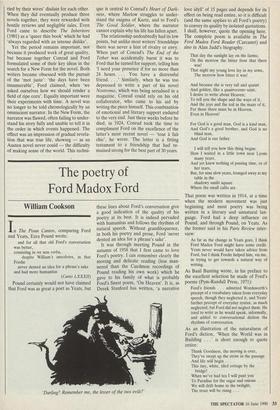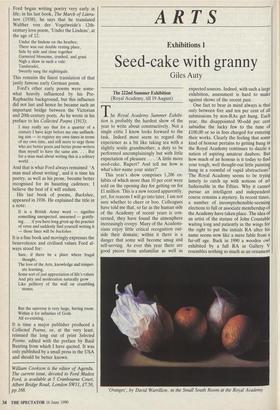The poetry of Ford Madox Ford
William Cookson
consisting in res non verba, despite William's anecdotes, in that Fordie never dented an idea for a phrase's sake and had more humanitas
(Canto LXXXII) Pound certainly would not have claimed that Ford was as great a poet as Yeats, but these lines about Ford's conversation give a good indication of the quality of his poetry at its best. It is indeed pervaded with humanitas and follows the rhythms of natural speech. Without grandiloquence, in both his poetry and prose, Ford 'never dented an idea for a phrase's sake'.
It was through meeting Pound in the autumn of 1958 that I first came to love Ford's poetry. I can remember clearly the moving and delicate reading (less man- nered than the Caedmon recordings of Pound reading his own work) which he gave to his family of what is probably Ford's finest poem, 'On Heaven'. It is, as Derek Stanford has written, 'a narrative `Darling? Remember me, the lesser of the two evils?' love idyll' of 15 pages and depends for its effect on being read entire, so it is difficult (and the same applies to all Ford's poetry) to convey its quality by isolated quotations. I shall, however, quote the opening here. The complete poem is available in The Ford Madox Ford Reader (Carcanet) and also in Alan Judd's biography.
That day the sunlight lay on the farms; On the morrow the bitter frost that there was!
That night my young love lay in my arms, The morrow how bitter it was!
And because she is very tall and quaint And golden, like a quattrocento saint, I desire to write about Heaven; To tell you the shape and the ways of it, And the joys and the toil in the maze of it, For these there must be in Heaven, Even in Heaven!
For God is a good man, God is a kind man, And God's a good brother, and God is no blind man, And God is our father.
I will tell you how this thing began: How I waited in a little town near Lyons many years, And yet knew nothing of passing time, or of her tears, But, for nine slow years, lounged away at my table in the shadowy sunlit square Where the small cafes are.
That poem was written in 1914, at a time when the modern movement was just beginning and most poetry was being written in a literary and unnatural lan- guage. Ford had a deep influence on Pound, and through Pound, on Yeats. As the former said in his Paris Review inter- view:
As far as the change in Yeats goes, I think Ford Madox Ford might have some credit. Yeats never would have taken advice from Ford, but I think Fordie helped him, via me, in trying to get towards a natural way of writing.
As Basil Bunting wrote, in his preface to the excellent selection he made of Ford's poems (Pym-Randall Press, 1971):
Ford's friends . . . admitted Wordsworth's precept of a vocabulary taken from everyday speech, though they neglected it, and Yeats' further precept of everyday syntax, as much neglected; but Ford did not neglect them. He tried to write as he would speak, informally, and added to conversational diction the rhythms of conversation.
As an illustration of the naturalness of Ford's diction, 'When the World was in Building . . .' is short enough to quote entire:
Thank Goodness, the moving is over, They've swept up the straw in the passage And life will begin . . .
This tiny, white, tiled cottage by the bridge! . . .
When we've had tea I will punt you To Paradise for the sugar and onions . . . We will drift home in the twilight, The trout will be rising . . .
Ford began writing poetry very early in life; in his last book, The March of Litera- ture (1938), he says that he translated Walther von der Vogelweide's 12th- century love poem, 'Under the Lindens', at the age of 12:
Under the lindens on the heather, There was our double resting place, Side by side and close together Garnered blossoms, crushed, and grass Nigh a shaw in such a vale: Tandaradei, Sweetly sang the nightingale.
This remains the finest translation of that justly famous early German poem.
Ford's other early poems were some- what heavily influenced by his Pre- Raphaelite background, but this influence did not last and hence he became such an important bridge between the Victorian and 20th-century poets. As he wrote in his preface to his Collected Poems (1913): I may really say that for a quarter of a century I have kept before me one unflinch- ing aim — to register my own times in terms of my own time, and still more to urge those who are better poets and better prose-writers than myself to have the same aim. . . . But for a man mad about writing this is a solitary world . . .
And that is what Ford always remained: 'A man mad about writing', and it is time his poetry, as well as his prose, became better recognised for its haunting cadences; I believe the best of it will endure.
His last book of poems, Buckshee, appeared in 1936. He explained the title in a note:
It is a British Army word — signifies something unexpected, unearned — gratify- ing . . . if you have long given up the practice of verse and suddenly find yourself writing it — those lines will be buckshee.
It is a fine book and movingly expresses the benevolence and civilised values Ford al- ways stood for:
Sure, if there be a place where frugal thought, The love of the Arts, knowledge and temper- ate learning, Some sort of just appreciation of life's values And pity and moderation naturally grow Like pellitory of the wall on crumbling stones.
But the universe is very large, having room Within it for infinities of Gods All co-existing, . . .
It is time a major publisher produced a Collected Poems, or, at the very least, reissued the long out of print Selected Poems, edited with the preface by Basil Bunting from which I have quoted. It was only published by a small press in the USA and should be better known.
William Cookson is the editor of Agenda. The current issue, devoted to Ford Madox Ford, is available at 5 Cranbourne Court, Albert Bridge Road, London SW11, £7.50, PP-168-



















































 Previous page
Previous page